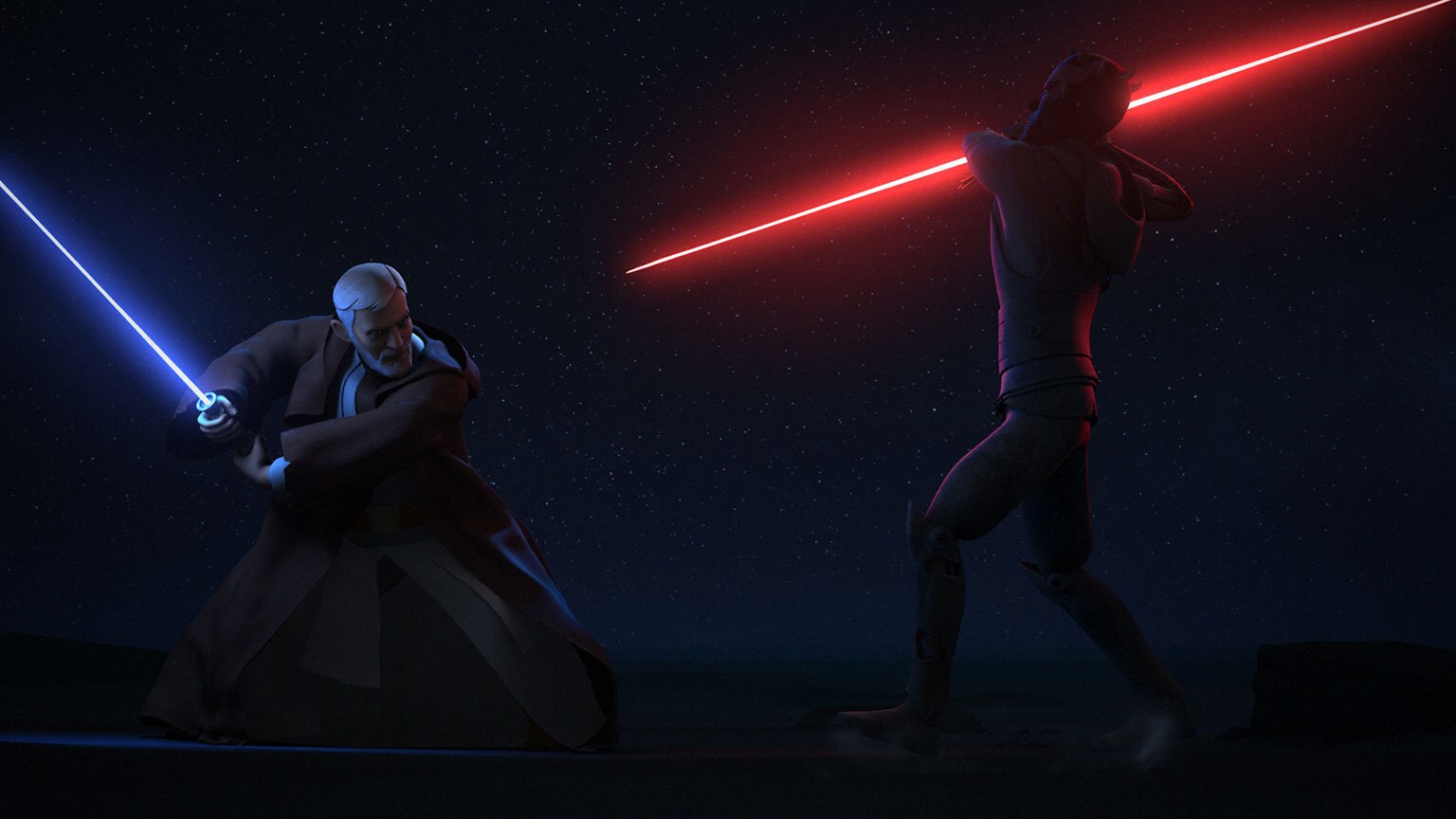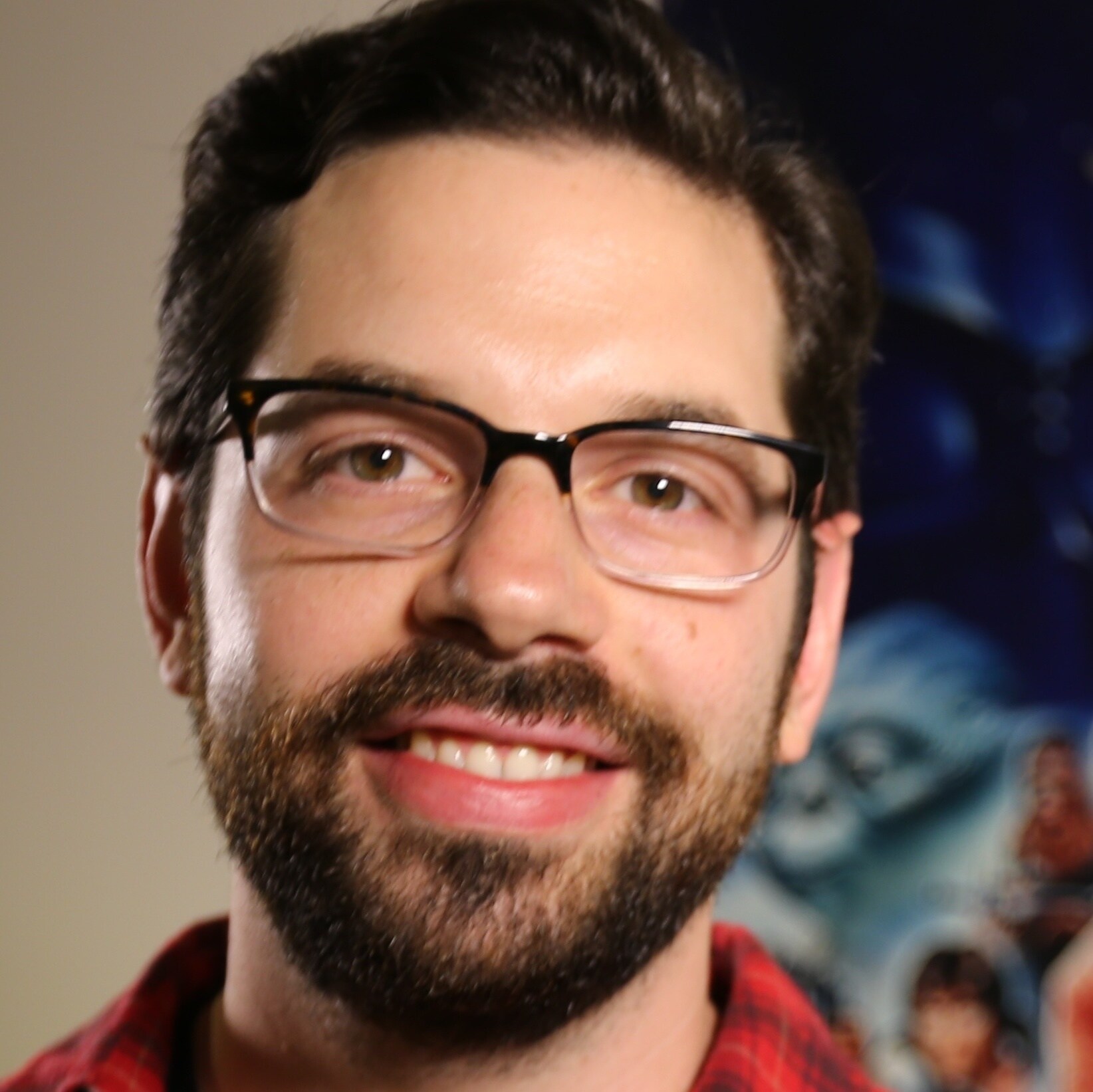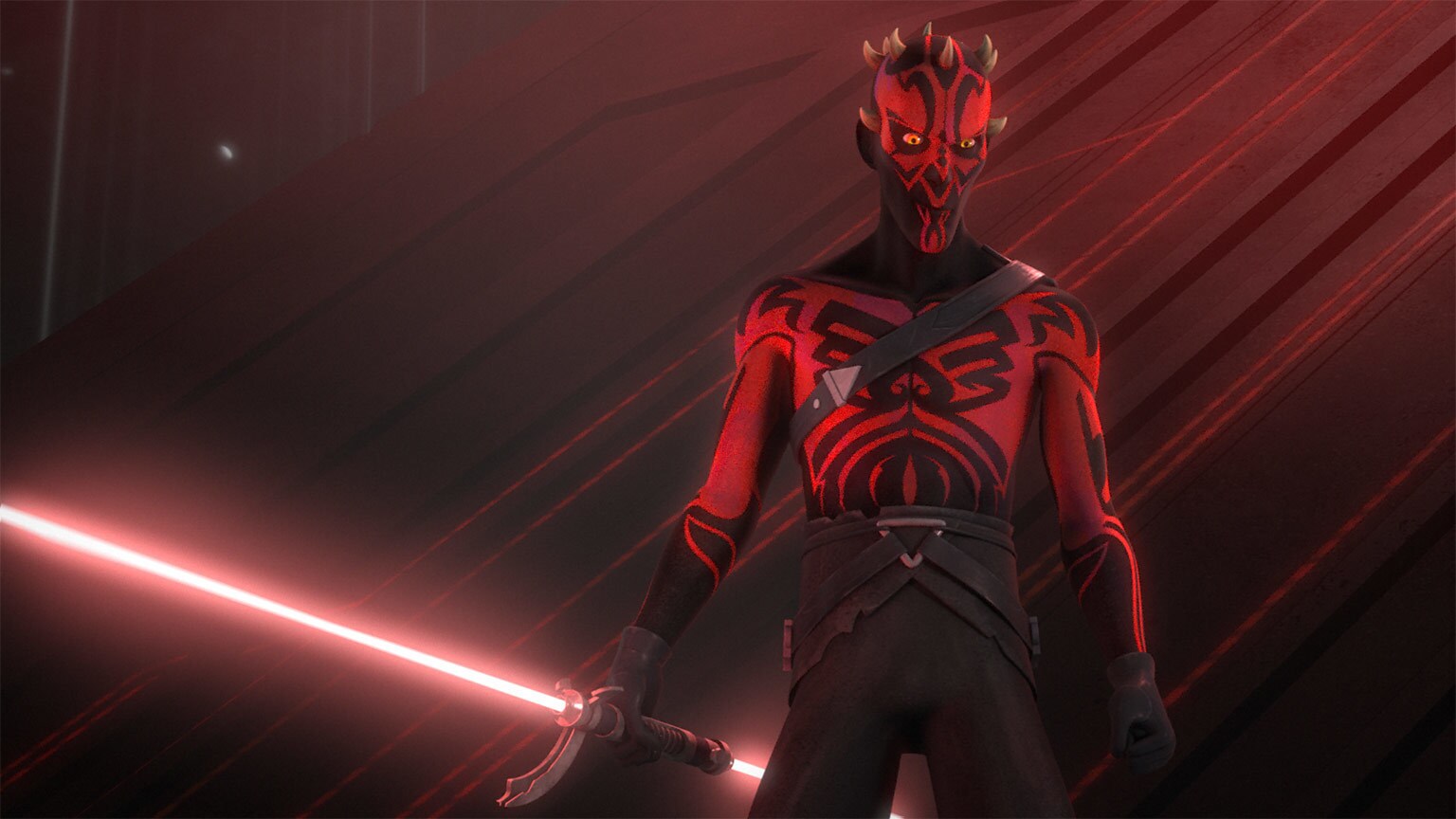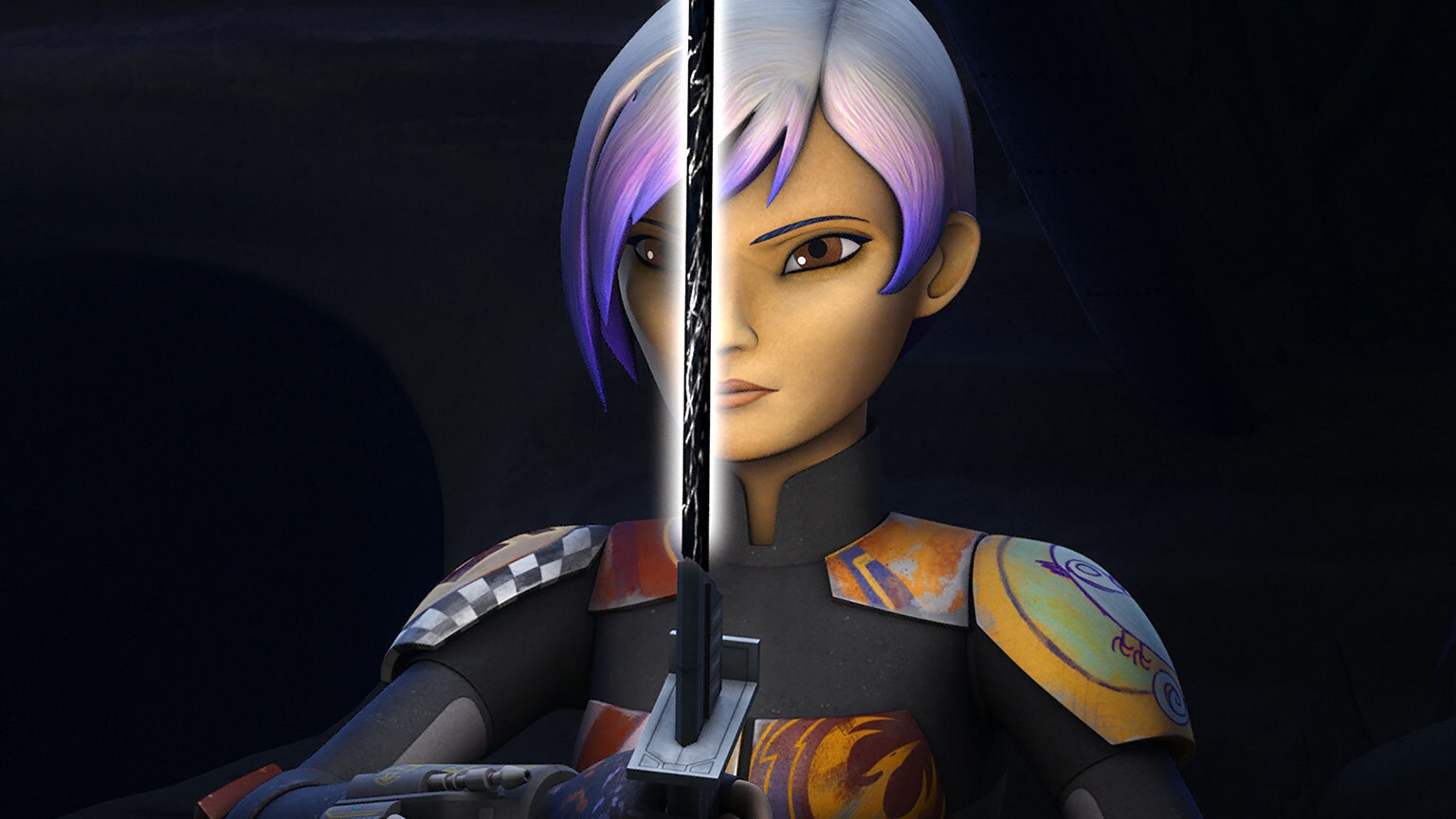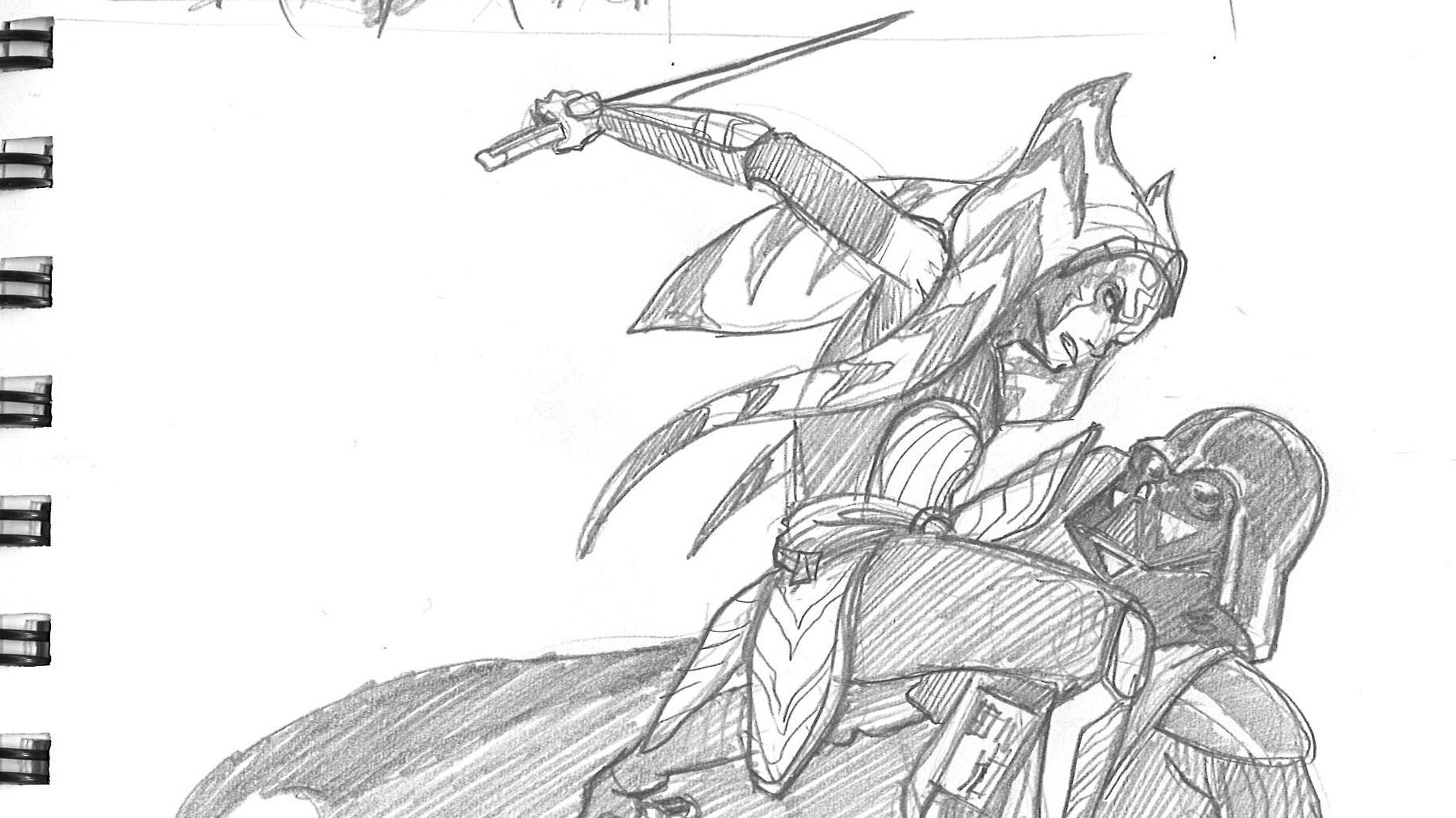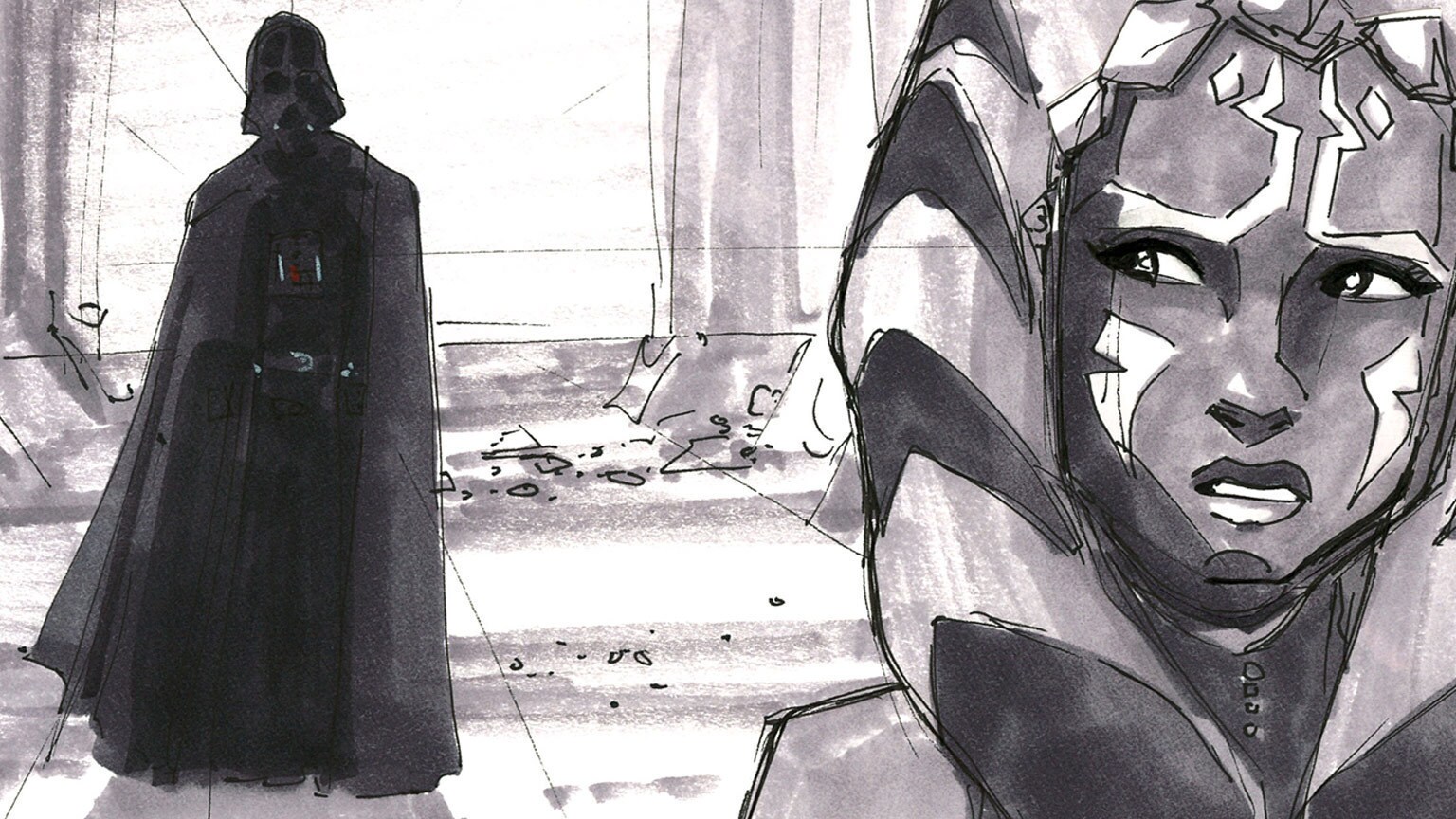Things are never easy for our friends on the Ghost crew. Following Season Two's devastating clash with Darth Vader and a scheming Maul, Season Three introduced a new enemy: strategic genius Grand Admiral Thrawn, a fan-favorite from Legends books and perhaps the rebellion's greatest threat. On top of that, everyone had their own personal developments, from Ezra's quest to destroy the Sith to Kanan's interactions with Bendu to Sabine's growth into a true leader. Plus, Maul finally got his rematch with Obi-Wan Kenobi. To mark the arrival of Season Three on Blu-ray and DVD, StarWars.com trekked down to executive producer Dave Filoni's office to talk about the season's biggest beats and moments, including Ezra's missteps, the tragedy of Maul, and finally pitting Hera against a worthy adversary.
StarWars.com: What struck me about this season was that, compared to previous seasons, it had a real focus on the rebellion and the war, and the Jedi element was more in the background. Was that your intention? What would you say were your goals?
Dave Filoni: I think that naturally happens with Thrawn as the bad guy. When you have a lightsaber-wielding bad guy, the Force stuff becomes more prevalent. There is an aspect of it with Bendu, but we wanted to go a different direction after Vader and Ahsoka and everything in Season Two.
We wanted the characters to have to react to that encounter, and how Ezra tries to deal with it. The main story for Ezra is one of trying to look outward to solve his problems, trying to seize power and then looking for power somewhere else, instead of looking inside himself, relying on what he’s learned, and relying on his friends. He goes down a long path of looking for a solution. It’s Obi-Wan Kenobi who has to remind him to get back on track, be brave and take up the call and responsibility of protecting his world and his friends.
The military aspect that’s a little more prevalent this year is all due to Thrawn, because that’s how his mind works. There are a couple big [Jedi] arcs in this season, but we wanted to bring an element of the rebels in with Mon Mothma and Saw. Thrawn’s on the opposite side of that, so it really stacks that way. I also don’t think that you can go much into the Force and its mysticism without undermining it too much. You have to be very careful. Although in Season Four, I would argue that we go deeper than we ever have, which is great because now I think you’re ready for it, as Ezra commits to this idea of what he needs to do.
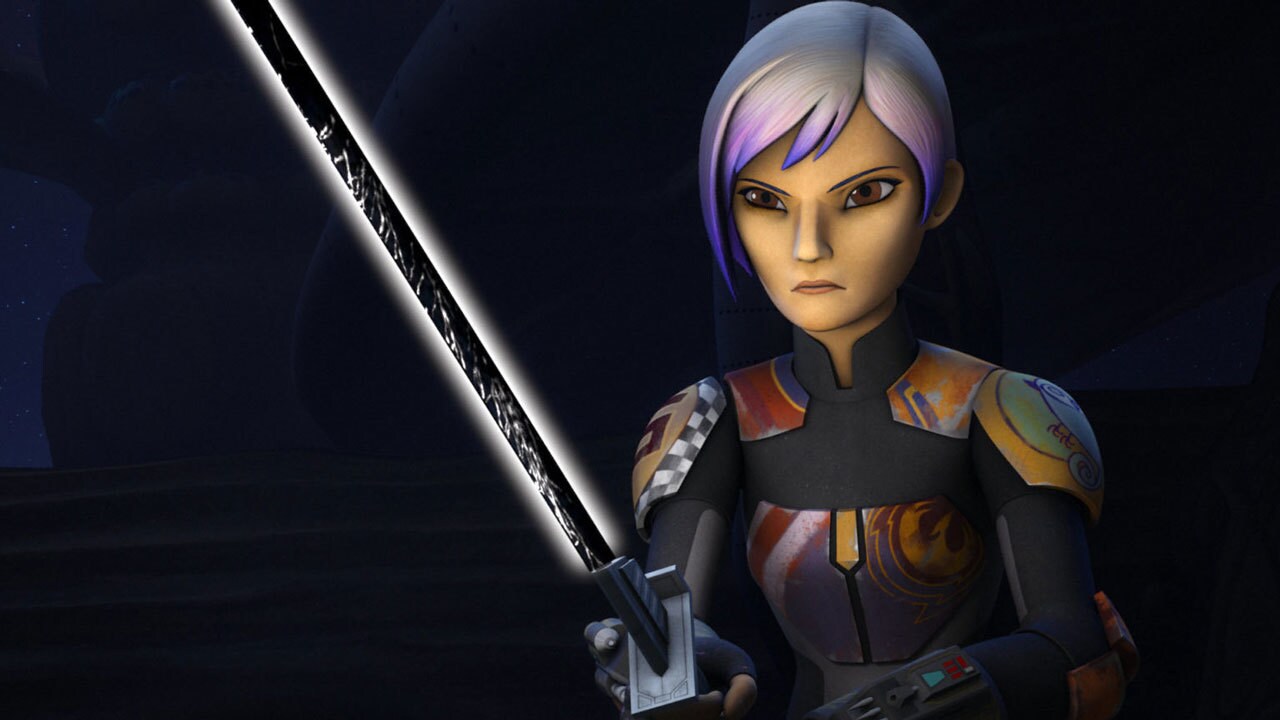
StarWars.com: I think a nice side benefit to this, though, is that other characters got the chance to shine. Sabine got a really big push. What did you want to do with her this year?
Dave Filoni: I wanted her to really come into her own. I see her as much the hero of the show as Ezra now. I think we have a kind of two-pronged hero assault with Ezra and Sabine. She’s really risen to that role. Her effort to learn to wield the Darksaber is that validation that she can concentrate and learn. What makes “Trials of the Darksaber” work for me is that she’s conquering personal demons while achieving her goal. It’s not really about the sword-fighting skill. It’s about the fight she is having with herself. Those are things I was really excited about, as far as watching her in that episode and what her development was as I wrote it, and wanting to feel that she had something personal to overcome. We see the fallout of that even into Season Four. We’ll deal with more of Sabine’s family drama [Laughs], which is great. I think a lot of people related to this episode because it was so personal.
StarWars.com: Why do you think that is? Because people have their own family issues and they get it?
Dave Filoni: Yeah, absolutely. Star Wars is the story of family. The problems [Sabine] has, even though they’re in a galaxy far, far away, are very relatable. It doesn’t mean you’ve developed a weapon like she did [Laughs], but maybe you have some type of conflict with your family or your friends. In this case, it’s just manifested in a really cool way in Star Wars.
StarWars.com: How far back did you plan the specifics of Sabine getting the Darksaber?
Dave Filoni: We always wanted to tell the story of Sabine’s past and what it was that drove her away from Mandalore, the Academy, and from the Empire. Bringing Maul into the series presented opportunities we didn’t have before, including the Darksaber. We immediately thought: “Well, would Sabine get the Darksaber because she’s Mandalorian?” We debated that for a while, but decided it was the best way to manifest that story.
From the beginning of Rebels, I wanted to do a very intense sword-training episode. It was something that Kathy Kennedy and I had talked about, as far as Jedi go, and Samurai films, and how the teaching and learning of technique and footwork and hand position can be very crucial. You get that sense in old Samurai films, [Akira] Kurosawa films, that there’s this study, and we didn’t really get to do that with Ezra. Ezra was conquering other aspects of his character at the start of the series. His lightsaber training began with throwing milk cartons. That’s also a reflection of Kanan’s lack of confidence in training Ezra. He didn’t know how to do it. Through the series both characters have grown and with Kanan becoming a better teacher, we had an opportunity to explore actual sword training. Because Sabine’s not a Jedi, you feel like he takes it more seriously and limits her in certain ways. It just became the right story to tell and I wish that I could have gone on longer.
StarWars.com: Nerd question...
Dave Filoni: Of course. The best kind.
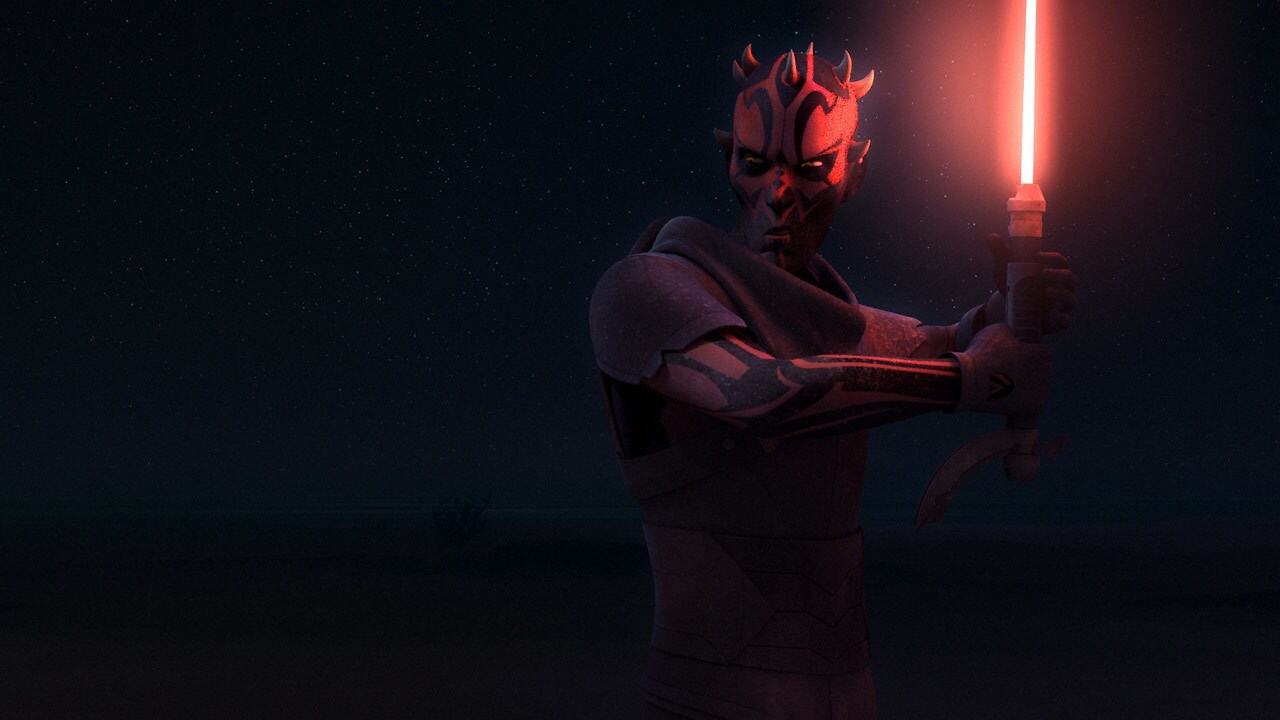
StarWars.com: Why is Maul not using the Darksaber?
Dave Filoni: [Pauses] I don’t know. He’s not against it, but it is a different kind of sword. It’s not that it’s necessarily more powerful than any other lightsaber -- in fact, you can make a strong argument that it’s not. It’s an old, old, old lightsaber. For all I know, it has limitations. It’s obviously not a style that’s been replicated, and you can imagine that’s because Tar Vizsla understood something and added a Mandalorian twist to it that no one’s been able to replicate since. It’s a flat blade of energy, which is bizarre. Maul, I think, in his training, is more comfortable fighting with two. So he went back to a double-bladed lightsaber, probably just as a style preference more than anything. I think he sees it more as a trophy and a symbol than anything else. A fond memory of when he almost had ultimate power, which is something he’s always been after.
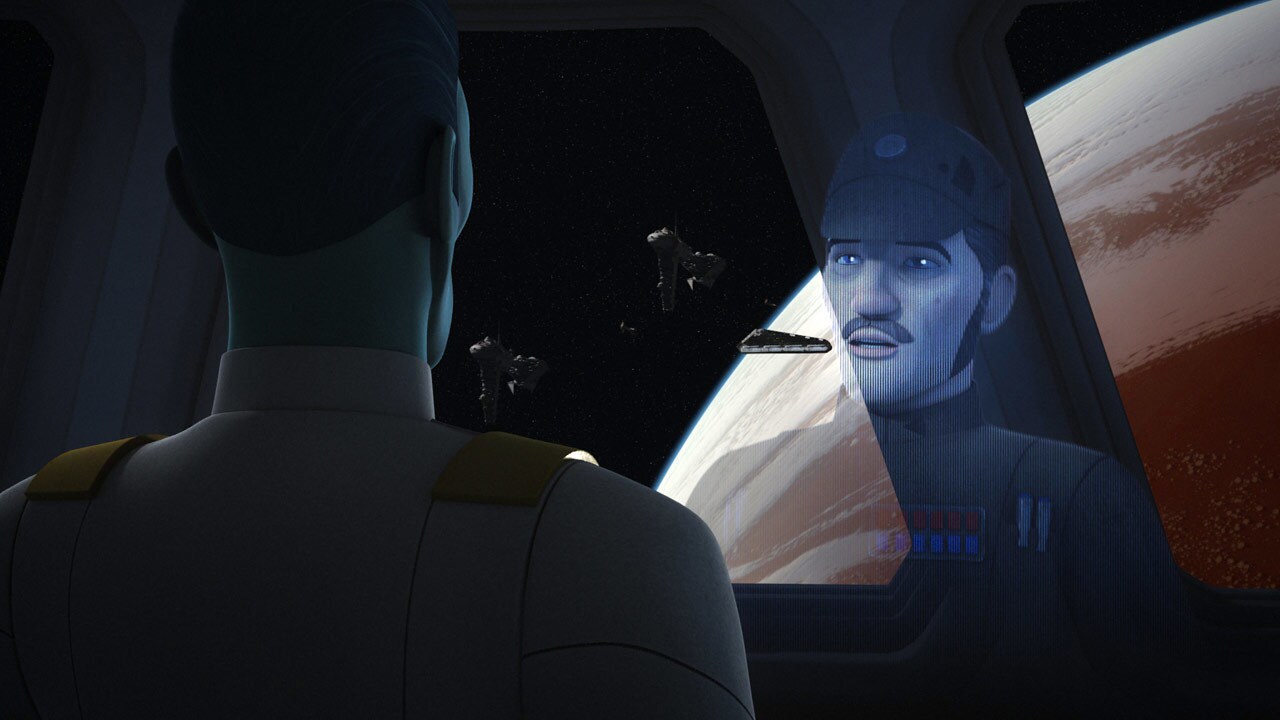
StarWars.com: One aspect I really liked about this season was the pacing with Thrawn. It was a slow burn, with him getting information and formulating a plan. If you look at the season as a whole, it seemed to me like a different kind of storytelling and pace from the first two seasons. Was that a conscious decision?
Dave Filoni: We knew we needed to pace Thrawn out. As exciting as it was to bring him in, it also presented a lot of difficulties because I was determined not to have him losing on a weekly basis. That would just have been terrible, so we created scenarios where it was reasonable that he was involved, but it was not his fault if they lost. In the last episode arc, we went a very long way around to explain that it’s really Konstantine’s ineptness. Thrawn even calls it out -- “If you don’t listen to me, you will create a problem and we could lose.” When you’re in command, you have to rely on other people. He can’t do it all himself.
Thrawn knows, at the end, the right move to play, but unfortunately for him, Konstantine undermines his efforts. I think Thrawn gets a win regardless, because he, pretty much, destroys the rebel fleet.
There’s a big effort here to undermine the rebellion in Rebels and knock them back to what they were in Season One. I’m trying to answer the question of, “How are they going to defeat the Empire?” The natural instinct there is, well, you think if they can befriend Mon Mothma, if they can get a fleet, they have all these ships, etc... People ask, “Dave, when will they get X-wings?” All this stuff that people want, and you think that that’s going to solve their problems. Well, people are in for a shock, because that might not resolve things. So, the question becomes, if force of arms won’t defeat the Empire, what will? It’s a very good question. It takes a very long time to answer that.
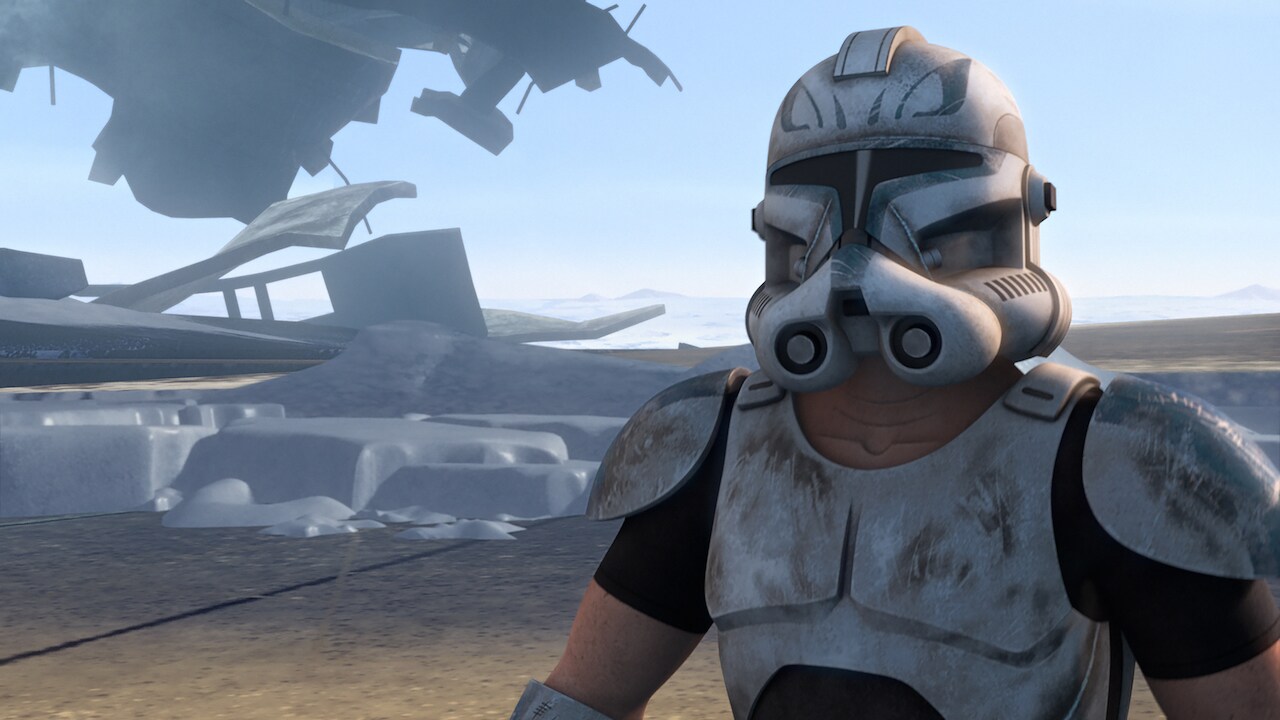
StarWars.com: This season also offered you a chance to tie up some loose ends from The Clone Wars, and one was “The Last Battle.” Where did the idea come from that you were going to take an opportunity to give some closure to characters who went through the Clone Wars?
Dave Filoni: We had toyed with this old battle droid story many times and we never found a good place for it. With Rex back, it seemed like there was an opportunity. Plus, Ezra didn’t have any perspective on the Clone War. He didn’t grow up in it, so there was the opportunity to have him ask, like he did when he first met Rex, “What is this all about?” Ezra sees it from a point of view that helps both Kanan and Rex understand what they went through. Even they didn’t fully understand it.
It’s a great thing to produce because you make battle droids, and when you make one, you get a whole bunch of them, so it works from a production level. The thought of battle droids confronting stormtroopers was really appealing. I like anything that really brings the prequel and the original trilogy periods together. I think it’s important to do so people understand these stories all work together as one piece. It’s not like the prequels end and everything in them just disappears.
Having worked in the prequel era for a long time, I know it really well. It was really interesting to see Kanan, Ezra, and Zeb dealing with it and, frankly, how dangerous some of it was. While the droids weren’t much of a match for Anakin Skywalker, they’re more than a match for someone like Ezra who’s not as well-trained. So, it gave a great perspective into what they’re capable of, too.
Once we set up where the characters were in Star Wars Rebels in the first season, and then once we had to deal with Darth Vader in the second season, we had an opportunity to explore some stuff in Season Three that we hadn’t gotten to yet. I think it really turned out well and made this season unique. You always want each season to be unique from the last.
StarWars.com: There’s something about seeing original and prequel trilogy elements come together that’s so surprising.
Dave Filoni: Right? It shouldn’t be, but it is.
We do have this strange thing where I was able to finish a lot of storylines from Clone Wars, things that never really got dealt with in the past. That felt good, and I felt like that followed through for a lot of people who wanted to know more about Ahsoka and wanted to know more about Rex, and so here’s how they got it.
StarWars.com: Is it important to you to tell those stories on a personal level, like it’s unfinished business? Is it for George Lucas, is it because you think it makes the story better? Or is it a little bit of everything?
Dave Filoni: I think it’s a little bit of everything. It feels right for Rebels characters to be involved with other characters. Plus, in a lot of ways, creatively, I’ve been the guardian of those characters. I think the audience feels it’s authentic if I’m the one behind telling their story. They have invested in these characters, and want to see that I’m still invested in them, as well. When I go back to telling more of their story, it validates everyone’s investment in them. Many people felt cheated that they didn’t get an ending to Star Wars: The Clone Wars.
Now when you look at it, and it wasn’t really intended, you can say you need to watch Clone Wars and then go into Rebels, and then you get the whole story. Which is kind of unique. We’ve been pretty lucky with what we’ve been able to do -- telling these stories and finishing stories that would’ve otherwise had no way to end.
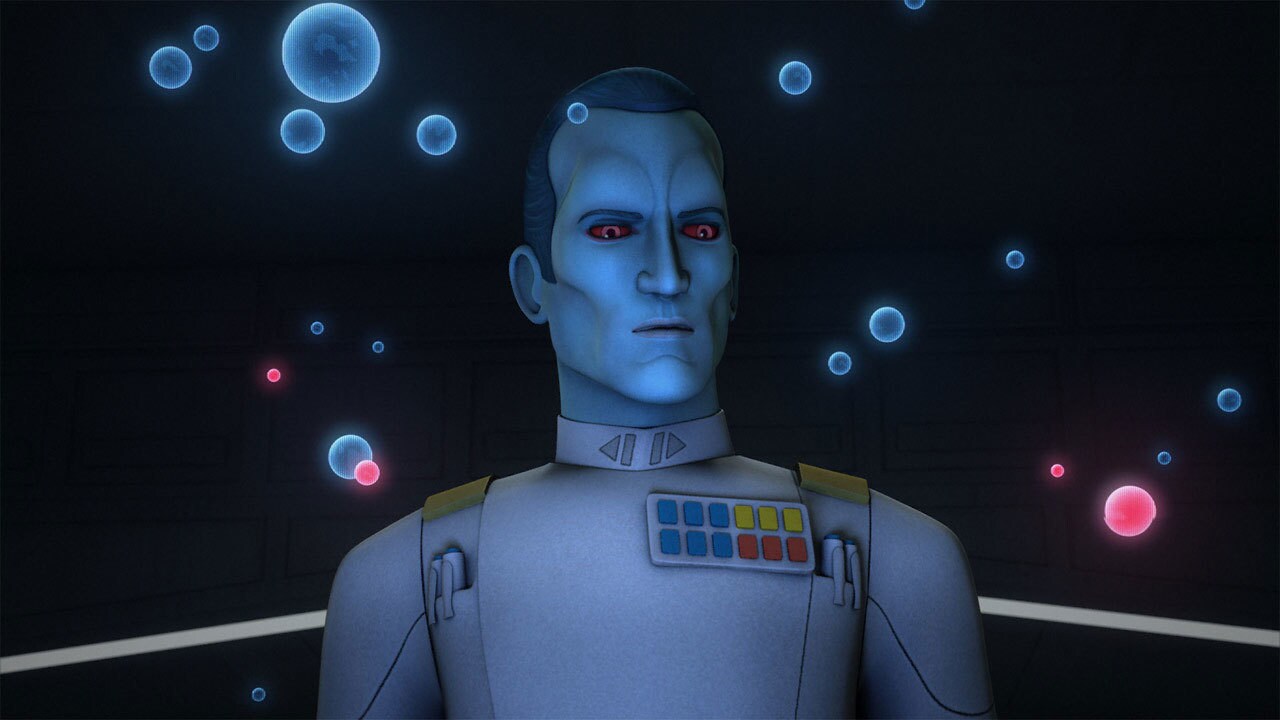
StarWars.com: I wanted to go back to Thrawn for a second. To go from the really heavy Jedi stuff, especially at the end of Season Two with Vader and Ahsoka, and then have a very different villain, was it difficult for you, in any way, to switch gears in terms of telling stories around him?
Dave Filoni: Not really. I mean, I always liked Thrawn. So the only thing I felt was a really big responsibility to try to get it right. I think Timothy [Zahn] did a tremendous job with that. I never really thought when I was a kid, reading those books, that I’d be responsible for portraying that character later on. He’s written in such a clear way.
What Thrawn really came down to, most importantly, was the voice. I thought, “We have to put a voice to a character that’s never really spoken before. The fans have their own view of it and that’s all valid. I have to find a person that can really encompass that voice and be everything to everyone.” Lars Mikkelsen, luckily, is that guy. It was one of the hardest castings we’ve ever had to do.
StarWars.com: Did you try other people?
Dave Filoni: We had talked to all kinds of people, all over the place, considered many different people. I was very resolute about the kind of actor I needed for the role. We listened to all kinds of suggestions and accents and it just so happened that we struck upon this idea of a Danish accent. It’s interesting and different. It’s not particularly recognizable but it’s unique. I also knew Lars’ work from his Sherlock Holmes episode with Benedict Cumberbatch in the mine library. I thought that was very Thrawn-like, to have all that information in his brain.
Lars has been just incredible in the role. He has been so inspiring. Once you get a voice like that in a role, then you can write to it. The character takes shape around the voice. He is dedicated to getting it right, he understands that the character is important. His character outlived his brother’s [Mads Mikkelsen], who’s in Rogue One, which is a hilarious inside joke for us. Lars was kind of the missing piece in the whole Thrawn thing. He just brings such dimension and cunning to it.
It’s astonishing to watch a villain in our show span more than one season. It’s never really happened. Kallus, kind of, but not the main big bad guy. When you watch Season Four, you really get that in a lot of ways. Thrawn’s like, “I’ve won. There’s nothing you guys can do.” Season Four is very different, in the best possible ways.
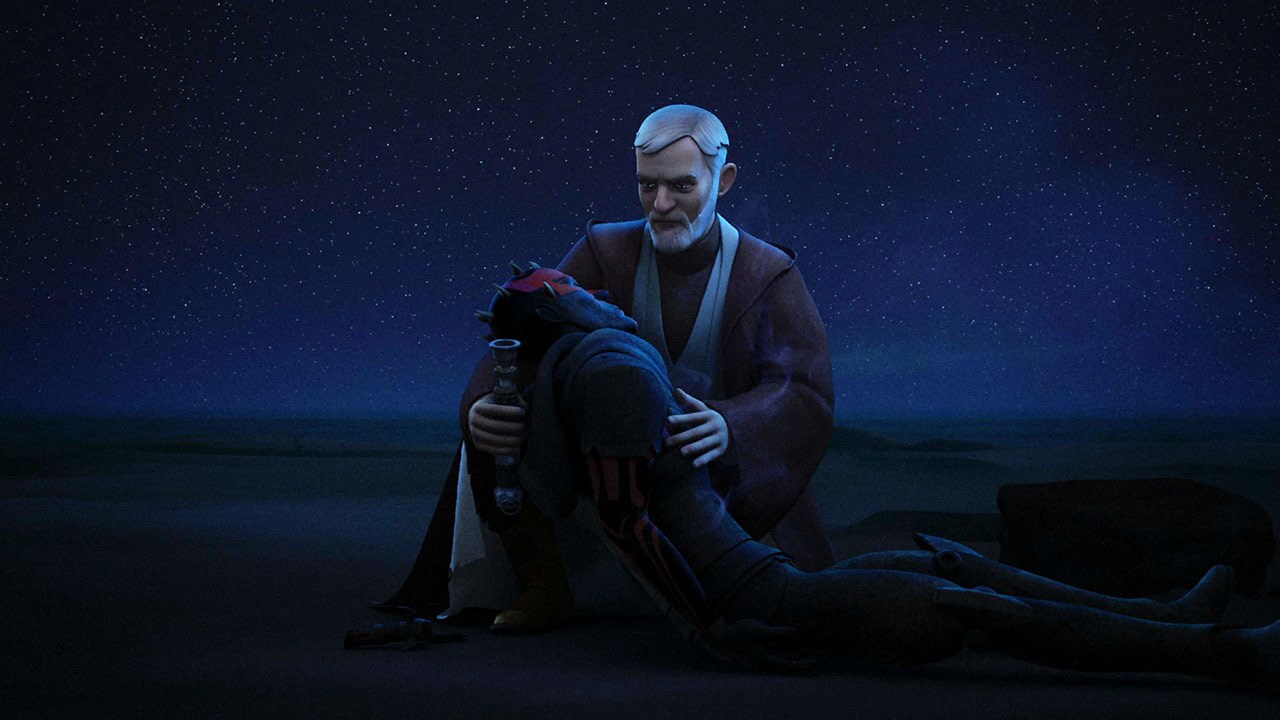
StarWars.com: Regarding Maul and everything that happened with him this season, how do you view him now, looking at his story as a whole? Do you see him as a tragic character? Do you think that he achieved any kind of understanding about his mistakes in the end?
Dave Filoni: No, I don’t. [Laughs] That’s the tragedy of him. Villains are terrible characters, they’re doing all the wrong things. But when you really understand them, you can see the sorrow and the tragedy of it. The sad thing is how they’ve tried to solve their problems by making other people suffer, and by trying to be powerful. They are the characters that are the most in fear, that are the most afraid of the world around them and of what people think. That’s true in life as it is in stories. The villains of our time often have poor childhoods or don’t feel loved, and all mythology leads you in that direction. Often, their becoming evil stems out of a great love or a great fear of rejection, or of not feeling important.
StarWars.com: Which he definitely had.
Dave Filoni: Maul saw the world before him as the apprentice to a Sith Lord, and then that world gets stolen from him and he never really recovers. He becomes so broken that you would think having his life restored would be something to be thankful for. He just uses the opportunity to try to amass more power, to try to once again prove to Palpatine that he should be at his side. When he’s thrown down again he’s even more broken. His whole aspiration is how to get to the top of the temple, to the top of the pyramid, which is really part of the symbolism of Malachor. Maul is waiting for someone so that he can be his own Sith Lord. Everything he does is a reflection of Palpatine. He hasn’t really done anything that’s representative of who he is.
In the end, what’s most important, is that Maul never lets go of this attitude of revenge. He never seeks forgiveness, he never seeks selflessness. He is bent on, “Okay, good, at least I’ll die knowing I’m going to have revenge,” and Obi-Wan just looks at him and shakes his head gently because he feels sorry for Maul. He doesn’t want to kill Maul by that point. Obi-Wan, to me, has grown as a character so much that he knows he could dispatch Maul, or Maul could dispatch him, but to what point? Obi-Wan is entering the realm of becoming selfless, and wholly selfless. He’s willing to give up so much so that everyone else can succeed, because he’s trying to make up for things in the Clone War -- things that went poorly for him.
There’s a lot of debated points now, I’ve heard, about what Obi-Wan’s doing and what he’s saying in those scenes. Obi-Wan believes, I think at this point, that Luke is the Chosen One. It doesn’t mean Obi-Wan’s right. He feels that everybody believed Anakin was the Chosen One, and he thinks that he’s not because he joined the Sith. That’s not true. If you listen to George [Lucas], George will tell you that Anakin is the Chosen One.
Obi-Wan believes that Luke is going to help him. I don’t think he knows what role Luke is going to play. For a while, you’re led to believe that Obi-Wan and Yoda think Luke should destroy Darth Vader, and somehow that’s going to help, but that’s not the way things get saved. The son is selfless in saving the father and the father is selfless in saving the son.
StarWars.com: Let me ask you a question about that. Yoda and Obi-Wan had learned about becoming selfless and maybe showing more compassion, yet they were still holding onto this idea of “You have to destroy Darth Vader,” which we learn was not really the answer. What’s your take on that? Was that still something they hadn’t learned yet?
Dave Filoni: I don’t know. I never asked George about it, because I thought maybe I don’t need to know everything. I wasn’t sure if they knew the answer and decided not to tell Luke, because if they told him, it invalidated it. Maybe Luke has to come to that understanding himself. You can’t provide the hero with all the answers that he needs. Yoda tells Luke [in The Empire Strikes Back], “Your weapons, you will not need them,” but he takes them anyway.
The moment Luke becomes a Jedi is clearly the moment he throws away his lightsaber, and he is on the ultra-enlightened path. That’s something the Emperor can’t understand. Seeing something he can’t understand, the Emperor tries to destroy him, not realizing that this action is the one thing that will trigger Anakin.
It’s funny, there are two moments like that. Where the Emperor tries to kill Luke and that triggers Anakin to save his son, and then when Mace Windu tries to kill the Emperor and that triggers Anakin to save the Emperor. Something about that tremendous peril and that sacrifice and taking lives that drives people… But I love symmetry, and I see a lot of symmetry in George’s storytelling. So when you see Qui-Gon dying in Obi-Wan’s arms, saying, “He is the Chosen One,” I have Maul dying in Obi-Wan’s arms saying, “Is he the Chosen One?” There is a symmetry there of that position for this character. It’s all meant to be that way.
Obi-Wan doesn’t want to fight Darth Maul. I think that’s hard for people to understand. Some people think that what they want is a big, long lightsaber fight. To what end? Every time Maul would block or parry Obi-Wan Kenobi would mean that he is his equal, and I just don’t think he is.
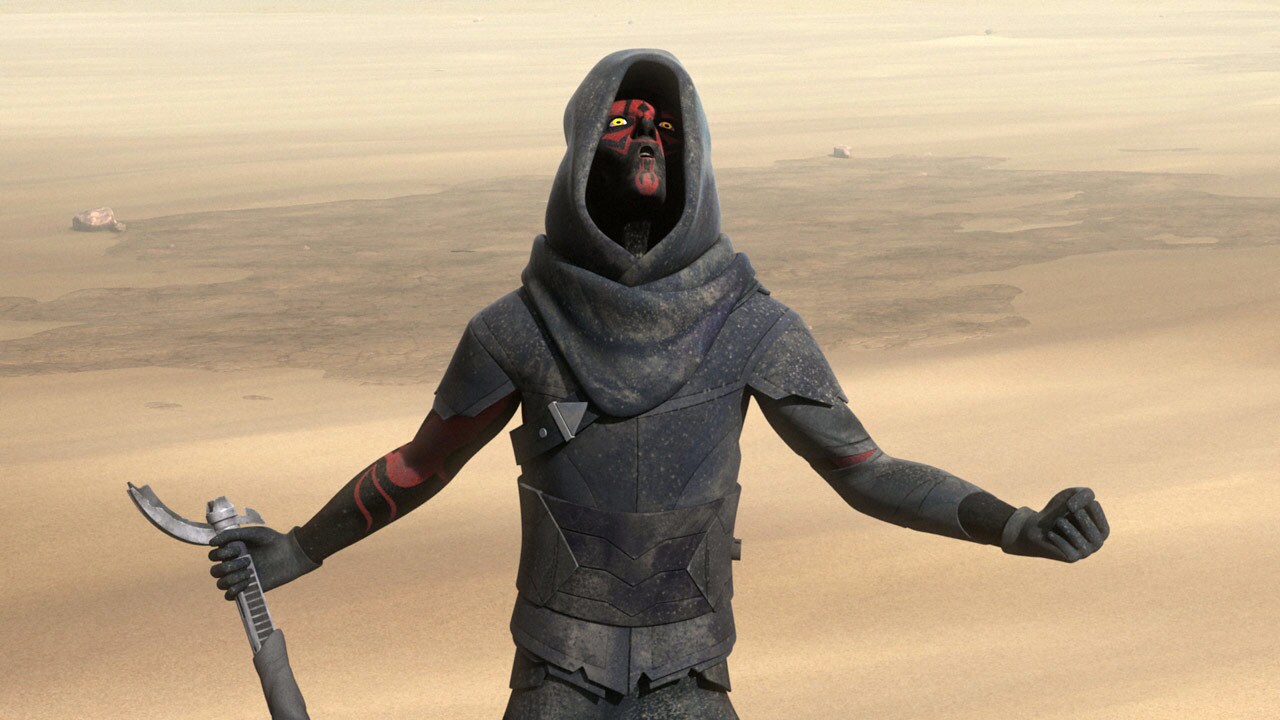
StarWars.com: Was there ever any possibility of another outcome for Maul? Not that he would have any kind of redemption, but maybe he’d go off somewhere and live by himself, or some other ending?
Dave Filoni: Characters like Maul can’t end that way. They draw their fate and run headlong into it. He’s going to have an impact. He would never just fade away. They plot and they hide and they scheme. He was just never going to go out quietly and live on the farm like Cut Lawquane. I think that putting an end to him before the original trilogy starts was the right way to go. You still tell the story of somebody that loses everything and never figures out how to redeem themselves, and then Obi-Wan loses everything but does. Their stories have a reflective purpose.
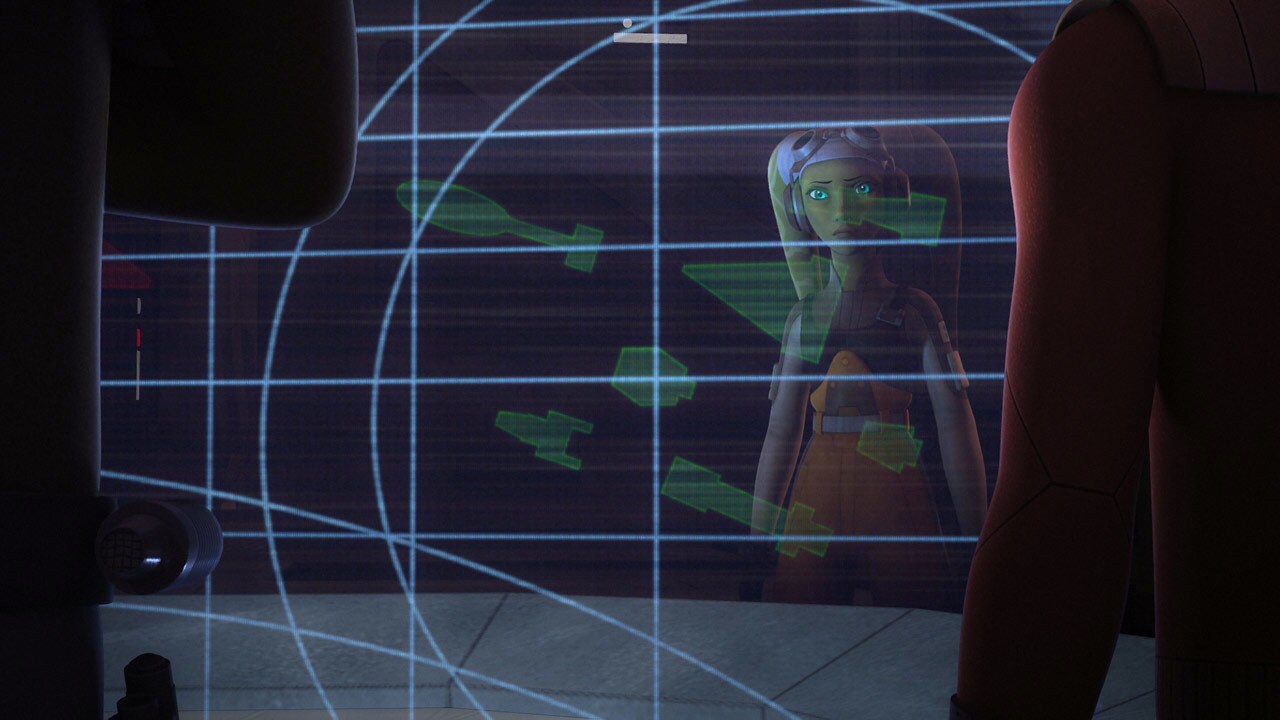
StarWars.com: I thought the finale played out like a great submarine movie. You have these two great minds -- Thrawn and Hera. What can you tell us about writing it?
Dave Filoni: It was always intentional to make Hera and Thrawn major adversaries in the military sense. She never really seems to get that great counter villain, and I wanted her to go face off against this great strategic mind. Having her controlling the defense against him, I think makes a lot of sense. It’s almost like the matriarch saying, “Don’t mess with my family,” and here comes this cold, calculating mind to destroy it. He isn’t even accepting surrenders at this time. It’s nice that we got them in a position where she can really show her strength as a combatant. I think it worked out well, and I think Hera composes herself well. They get away, but not much else, which still makes Thrawn the strategic genius of it all.
StarWars.com: When you compare it to where the show started, which was with these kind of small, pocket blaster fights, and now you’re at this large scale assault, is that evolution something you’re conscious of?
Dave Filoni: Sure. I wish we could have started there in the beginning when we were rescuing a couple of Wookiees off a platform with very few stormtroopers. Now I look at this battle and I’m blown away. There were a lot of things that were happening at that time, production-wise, that we needed to figure out quickly. Now I think everybody is more confident, creatively and artistically, with what we’re doing and we can get farther down the field. Season Four is even better.
If you’re going to do a space battle, it has to be a full-on, major space battle. With the movies all around us all the time now, you can’t cut any corners. I want the experience for the viewer to be on par with Rogue One. I don’t just want to be a TV reflection of it. That’s hard, but we find ways to compete and make it as big as the entire story of Star Wars deserves. That’s what every aspect of our company’s trying to do. I’ve talked to the guys on Rogue One, and we worked together on having ship continuity and the ways they fight. It’s amazing how much bigger and better it gets.
StarWars.com: As it should.
Dave Filoni: As it should and does.
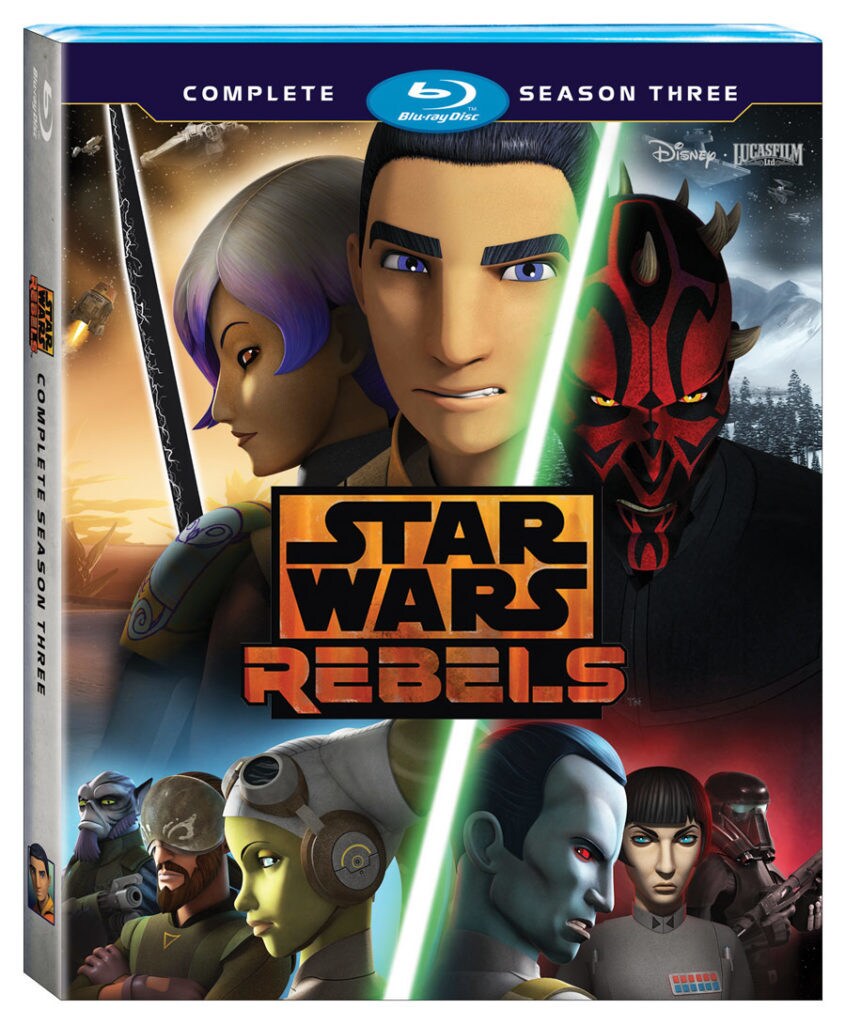
Star Wars Rebels: Complete Season Three is available now on Blu-ray and DVD.
Dan Brooks is Lucasfilm’s senior content writer and editor of the StarWars.com blog. He loves Star Wars, ELO, and the New York Rangers, Jets, and Yankees. Follow him on Twitter @dan_brooks where he rants about all these things.




